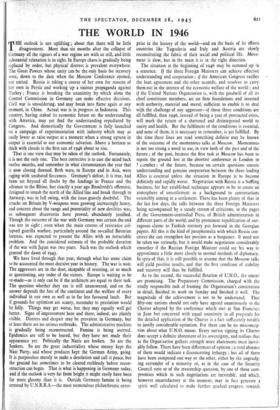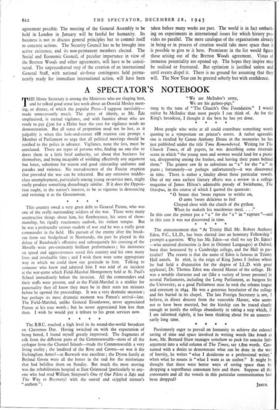THE WORLD IN 1946
THE outlook is not uplifting ; about that there will be little disagreement. More than six months after the collapse of Germany all the rigours of a war regime are with us still, and little substantial relaxation is in sight. In Europe chaos is gradually being replaced by order, but physical distress is prevalent everywhere. The Great Powers whose unity can be the only basis for recovery were, down to the date when the Moscow Conference opened, not united. Russia is taking a course of her own for reasons of her own in Persia and working up a sinister propaganda against Turkey ; France is breaking the unanimity by which alone the Control Commission in Germany can make effective decisions. Civil war is smouldering, and may break into flame again at any moment, in China. Actual war is in progress in Indonesia. This country, having staked its economic future on the understanding with America, may yet find the understanding repudiated by Congress. And domestically the Government is fully launched on a campaign of experimentation with industry which may as easily lower as raise output at a moment when a strong upturn in output is essential to our economic salvation. Above a horizon so thick with clouds is the first sun of 1946 about to rise.
That is one view that may be taken of the outlook. Fortunately, it is not the only one. The best corrective is to cast the mind back twelve months, and remember in what circumstances the year that is now closing dawned. Both wars, in Europe and in Asia, were raging with unabated fierceness. Germany's defeat, it is true, had been set beyond all doubt by the landings in France and the advance to the Rhine, but exactly a year ago Rundstedt's offensive, designed to smash the north of the Allied line and break through to Antwerp, was in full swing, with the issue gravely doubtful. The attacks on Britain by V-weapons were growing increasingly heavy, and concern about the range and potentiality of new devilries was, as subsequent discoveries have proved, abundantly justified. Though the outcome of the war with Germany was certain the end was not in sight ; even when the main centres of resistance col- lapsed guerilla warfare, particularly around the so-called Bavarian fortress, was expected to present the Allies with an intractable problem. And the considered estimate of the probable duration of the war with Japan was two years. Such was the outlook which greeted the dawn of 1945.
We have lived through that year, through what has some claim to be accounted the most decisive year in history. The war is won. The aggressors are in the dust, incapable of resisting, or so much as questioning, any order of the victors. Europe is waiting to be re-made—as it only can be if the architects are equal to their task. The question whether they are is still unanswered, and on the answer depends the fate of the continent and the welfare of every individual in our own as well as in• far less favoured lands. But if grounds for optimism are scanty, surrender to pessimism would be folly. Things may get worse, but they may equally well get better. Signs of improvement here and there, indeed, are plainly visible. Distress and despair may be prevalent in Germany, but at least there are no serious outbreaks. The administrative machine is gradually being reconstructed. Famine is being averted. Epidemics are still to be feared, but they have not made their appearance yet. Politically the Nazis are broken. So are the Junkers. So are the great industrialists whose money kept the Nazi Party, and whose products kept the German Army, going. It is purposeless merely to make a desolation and call it peace, but the ground has sometimes to be cleared ruthlessly before recon- struction can begin. That is what is happening in Germany today, and if the outlook is very far from bright it might easily have been far more gloomy than it is. Outside Germany famine is being arrested by U.N.R.R.A.—the most tremendous philanthropic enter- prise in the history of the world—and on the basis of its efforts countries like Yugoslavia and Italy and Austria are slowly reconstituting the fabric of their social and political life. Move- ment is slow, but in the main it is in the right direction.
The situation at the beginning of 1946 may be summed up in a sentence. If the three Foreign Ministers can achieve effective understanding and cooperation ; if the American Congress ratifies the loan agreement and the other accords, and resolves to carry them out in the interest of the economic welfare of the world ; and if the United Nations Organisation is, with the goodwill of all its chief constituent members, set on firm foundations and invested with authority, material and moral, sufficient to enable it to deal wish the challenge of any aggressor—if those three conditions are all fulfilled, then 1946, instead of being a year of protracted crisis, will mark the return of a shattered and disintegrated world to sanity and health. But the fulfilment of the conditions is essential, and none of them, it is necessary to remember, is yet fulfilled. By the time these lines are read something definite may be known of the outcome of the momentous talks at Moscow. Momentous is not too strong a word to use, in view both of the past and of the future ; of the past, because the first task at Moscow has been to regain the ground lost at the abortive conference in London in ? czember ; of the future, because on certain questions sincere understanding and genuine cooperation between the three leading Allies is essential unless the situation in Europe is to become definitely and rapidly worse. Negotiation with Russia is a baffling business, for her established technique appears to be to create an atmosphere of unsettlement as a background to conversations ostensibly aiming at a settlement. There has been plenty of that in the last few days, the talks between the three Foreign Ministers being accompanied by a steady stream of criticisms, in the pages of the Government-controlled Press, of British administration in different parts of the world, and by prominent republication of out- rageous claims to Turkish territory put forward in the Georgian papers. All this is the kind of paraphernalia with which Russia con- ceives she can strengthen her position as a bargainer. It need not be taken too seriously, but it would make negotiation considerably smoother if the Russian Foreign Minister could see his way to approximate a little more closely to normal methods of diplomacy. In spite of that, it is still possible to assume that the Moscow talks will yield positive results, and that the first condition of stability and recovery will thus be fulfilled.
As to the second, the successful flotation of U.N.O., the omens are promising. The Preparatory Commission, charged with the vitally responsible task of framing the Organisation's constitution in detail, finished its work on Sunday and finished it well. The magnitude of the achievement is not to be underrated. That fifty-one nations should not only have agreed unanimously to the Charter adopted by the conference which met at San Francisco in June but concurred with equal unanimity in all proFosals for the detailed application of the Charter is a fact sufficiently notab!e to justify considerable optimism. For there can be no misconcep- tion about what U.N.O. means. Every nation signing its Charter does accept a definite abatement of its sovereignty, and realises that as the Organisation gathers strength more abatements must inevit- ably follow. There have been differences of opinion ; a total absence of them would indicate a disconcerting lethargy ; but all of them have been composed one way or the other, either by the ungrudg- ing surrender of a minority or, as in the case of the Security Council veto or of the trusteeship question, by one of those com- promises which in such negotiations are inevitable, and which, however unsatisfactory at the moment, may in fact generate a spirit well calculated to make further gradual progress towards agreement possible. The meeting of the General Assembly to be held in London in January will be fateful for humanity. Its business is not to discuss general principles but to commit itself to concrete actions. The Security Council has to be brought into active existence, and its non-permanent members elected. The Social and Economic Council, of peculiar importance in view of the Bretton Woods and other agreements, will have to be consti- tuted. The unprecedented step of the creation of an international General Staff, with national air-force contingents held perma- nently ready for immediate international action, will have been taken before many weeks are past. The world is in fact embark- ing on experiments in intematio9a1 issues for which history pro- vides no parallel. The mere catalogue of the organisations already in being or in process of creation would take more space than it is possible to give to it here. -Prominent in the list would figure those arising out of the Bretton Woods agreement. Vistas of immense potentiality are opened up. The hopes they inspire may be realised or frustrated. But optimism is justified unless and until events dispel it. There is no ground for assuming that they will. The New Year can be greeted soberly but with confidence.































 Previous page
Previous page